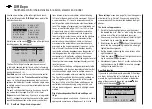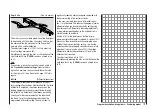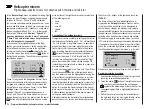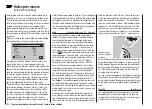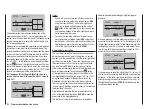
115
Program description: helicopter mixers – model helicopter
Simultaneously pressing the
4.
or
buttons of
the right-hand touch-key (
CLEAR
) resets an altered
value to the default value.
Touch the central
5.
SET
button of the right-hand touch-
key to conclude the input process.
ptch
(Collective pitch (ch1
pitch))
Select the “Collective pitch” line using the arrow buttons
of the left or right-hand touch key, then touch the
central
SET
button of the right-hand touch-key:
input
output
point
3
0%
0%
0%
ptch
normal
The control curve can be based on a maximum of
five nodes, known as “reference points”, which can be
placed along the length of the control travel; separate
curves can be programmed for each flight phase.
However, in most cases it is sufficient to use a smaller
number of reference points when defining the collective
pitch curve. As a basic rule we recommend that you
start with the three default reference points offered by
the software. These three points, i. e. the two end-points
“Point 1” (collective pitch minimum) and “Point 5” (collec-
tive pitch maximum), and “Point 3”, exactly in the centre
of the travel, initially describe a linear characteristic
for the collective pitch curve; this is represented in the
picture above.
The programming procedure in detail
The throttle / collective pitch stick can now be used to
move the vertical line in the graph between the two
end-points “Point 1” and “Point 5”; at the same time the
momentary position of the stick is displayed in numeric
form in the “Input” line (-100% to +100%).
The point where the vertical line crosses the curve is
termed the “Output”, and this point can be varied within
the range -125% and +125% at a maximum of five
reference points. The control signal, modified in this way,
affects the collective pitch servos only. In the picture on
the left the stick is exactly at the 0% position at “Point
3”, and also generates an output signal of 0% due to the
linear nature of the graph.
By default only points “1” (collective pitch minimum at
-100%), “3” (hover point at 0%) and “5” (collective pitch
maximum at +100% travel) are active.
To set a point you use the associated stick to move the
vertical line to the point you wish to change. The number
and current curve value of this point are displayed in
the bottom line in the left-hand half of the screen in the
“Point” line. The arrow buttons of the right-hand touch-
key can now be used to change the current curve value
in the highlighted field to any value within the range
-125% to +125%, without affecting the adjacent points.
input
output
point
3
0%
+75%
+75%
ptch
normal
In this example we have moved reference point “3” to
+75%.
However, the optional points “2” and “4” can also be
activated. In the next example we activate point “2” at
-50% …
input
output
point
2
–50%
–12%
deact
ptch
normal
… and point “4” at +50% …
input
output
point
4
+50%
+88%
deact
ptch
normal
This is accomplished using the stick to move the vertical
line to the appropriate area. As soon as the message
“inactive” appears in the highlighted value field, you can
activate the associated point with the arrow buttons of
the right-hand touch-key; it can then be adjusted in the
same manner as the other points …
input
output
point
4
+50%
–50%
–50%
ptch
normal
… or reset to “inactive” by simultaneously pressing
the
or
buttons of the right-hand touch-key
(
CLEAR
).
Summary of Contents for mx-12 Hott
Page 1: ...Programming Manual 33116 mx 16 HoTT 3 en mx 16...
Page 35: ...35 For your notes...
Page 49: ...49 For your notes...
Page 55: ...55 For your notes...
Page 59: ...59 For your notes...
Page 63: ...63 For your notes...
Page 69: ...69 For your notes...
Page 91: ...91 For your notes...
Page 101: ...101 For your notes...
Page 123: ...123 For your notes...
Page 181: ...181 For your notes...
Page 193: ...193 For your notes...


